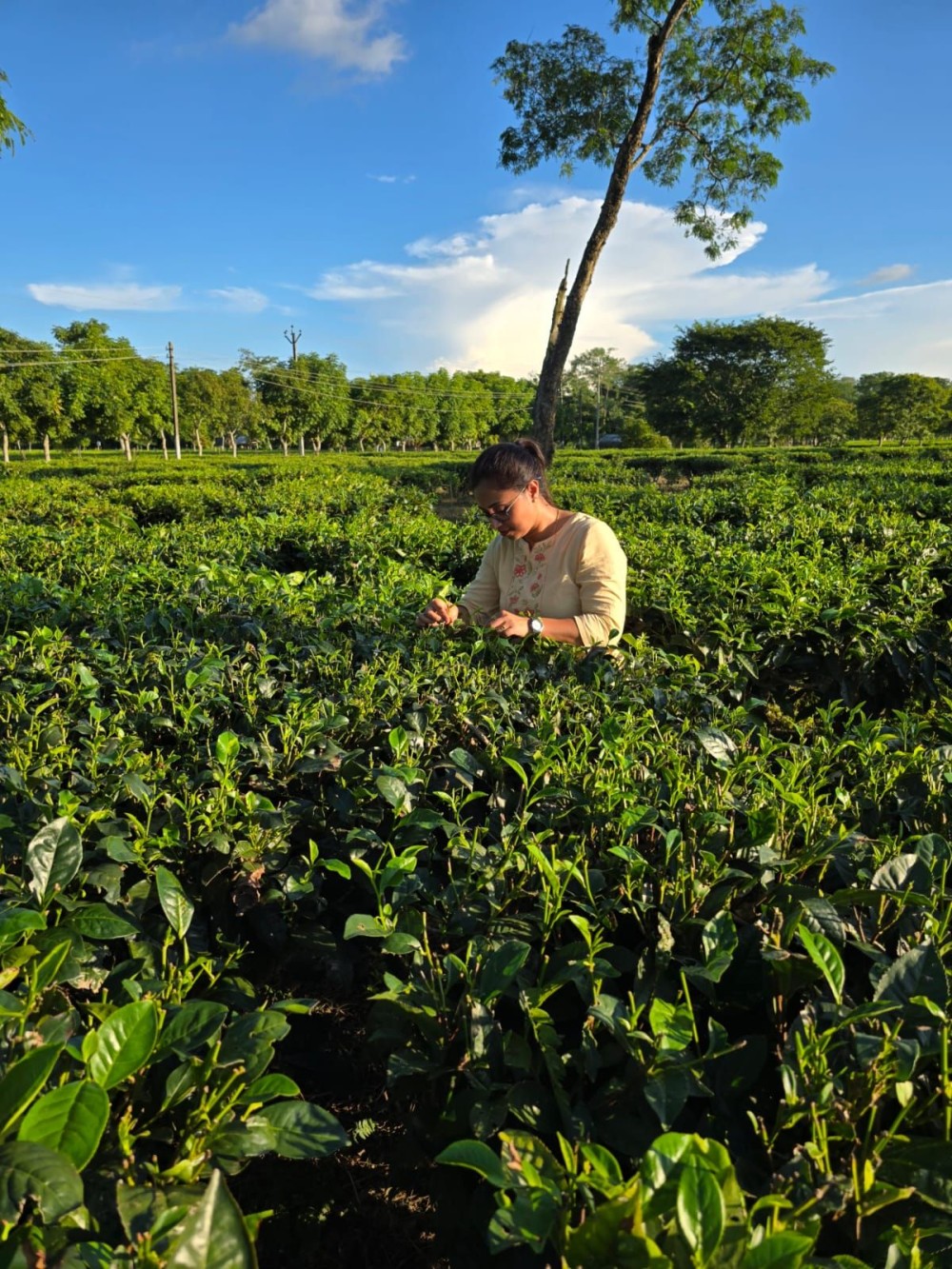Dr Sagarika Das, Centre for Biotechnology and Bioinformatics, Dibrugarh University is seen collecting tea blossoms from Assam’s tea estates

LUMAMI, October 13 (MExN): A Nagaland University-led multi-institutional study has revealed the untapped potential of tea blossoms for wellness products and sustainable rural development, a university statement said today.
Traditionally discarded as agricultural by-products, the study showed that tea blossoms are rich in bioactive compounds, making them a promising natural source for health supplements and functional beverages, it said.
The research was led by Dr Sagarika Das from the Centre for Biotechnology and Bioinformatics at Dibrugarh University (DU), in collaboration with tea biochemist Monoranjan Goswami of Tocklai Tea Research Institute, Jorhat, Assam, and Prof Tanmoy Karak from the Department of Soil Science, School of Agricultural Sciences, Nagaland University.
While global research has largely focused on tea leaves, blossoms have remained overlooked. The statement noted that the study marks the first systematic effort in Assam to analyse the biochemical richness of tea blossoms across seven premium cultivars, rather than the traditional emphasis on leaves.
Nutraceutical companies, it held, could use tea blossom extracts to develop natural energy boosters, relaxation aids, and skin-health products. Beyond consumer health, the study also presents economic opportunities for smallholder tea farmers by creating new revenue streams through blossom collection and processing.
The approach additionally supports environmental sustainability by reducing agricultural waste and contributing to a circular bio-economy, it added.
The study was published in the peer-reviewed Food Research Journal ([[https://doi.org/10.1016/j.foodres.2025.117337](https://doi.org/10.1016/j.foodres.2025.117337)]) and co-authored by Sagarika Das, Monoranjan Goswami, Ranjit Kumar Paul, Md. Yeasin, Animesh Sarkar, C.S. Maiti, Saumik Panja, Manoj Dutta, Jiban Saikia, and Tanmoy Karak. Contributions were also made by the University of California (U.S.), ICAR–Indian Agricultural Statistics Research Institute (New Delhi), and the Departments of Horticulture, Soil and Water Conservation, and Chemistry at NU and DU.
Elaborating on the study, Dr Das noted that tea blossoms are abundant in health-enhancing compounds, with notably higher concentrations of polyphenols, catechins, terpenoids, and L-theanine, while containing lower caffeine levels than traditional tea leaves.
“The combination of L-theanine and caffeine promotes mental clarity, relaxation, and stress reduction. By repurposing tea blossoms, we can reduce agricultural waste, increase rural incomes, and diversify the tea industry through nutraceuticals, herbal teas, and dietary supplements,” she added.
Prof Karak also shared that the study demonstrated tea blossoms as versatile ingredients that can be transformed into herbal teas, infused oils, dietary supplements, and unique wellness formulations.
“Rich in antioxidants and essential amino acids, they show promise for stress relief, cognitive enhancement, and the prevention of chronic diseases such as diabetes and cardiovascular disorders,” he added.
Terming tea blossoms as valuable nutraceutical resources, he highlighted their significant commercial potential and said that with further clinical validation, products derived from tea blossoms could promote overall wellness, stimulate rural economic growth, support local farmers, and create job opportunities.
NU Vice-Chancellor Prof Jagadish K Patnaik described the study as “groundbreaking,” highlighting how regional innovation can drive significant global impact.
RESEARCH COLLABORATORS
Dr. Sagarika Das, Centre for Biotechnology and Bioinformatics, Dibrugarh University, Assam
Mr. Monoranjan Goswami, Department of Biochemistry, Tocklai Tea Research Institute, Jorhat, Assam
Dr. Ranjit Kumar Paul and Dr. Md. Yeasin, ICAR–Indian Agricultural Statistics Research Institute, New Delhi
Dr. Animesh Sarkar, Prof. C. S. Maiti, Prof. Manoj Dutta, and Prof. Tanmoy Karak, School of Agricultural Sciences, Nagaland University, Medziphema, Nagaland
Dr. Saumik Panja, University of California, San Francisco, USA
Dr. Jiban Saikia, Department of Chemistry, Dibrugarh University, Assam






